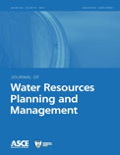
JOURNAL OF WATER RESOURCES PLANNING AND MANAGEMENT
Scope & Guideline
Navigating the Future of Water Resources Planning
Introduction
Aims and Scopes
- Water Resource Management Strategies:
Research on methods and frameworks for optimizing the management of water resources, including allocation and distribution strategies to enhance sustainability and resilience. - Hydroclimatic Impacts and Adaptation:
Studies examining the effects of climate change on water resources and the development of adaptive management strategies to mitigate these impacts. - Technological Innovations in Water Systems:
Exploration of advanced technologies such as machine learning, AI, and sensor networks for improving water distribution, leak detection, and system management. - Socioeconomic and Policy Analysis:
Analysis of the social implications of water management decisions, including equity considerations, governance, and policy frameworks influencing water resource allocation. - Integrated Water Resource Systems:
Research focusing on integrated approaches that consider the interactions between water, energy, and food systems, emphasizing the importance of a holistic view in resource management.
Trending and Emerging
- Climate Resilience and Adaptation Strategies:
There is an increasing focus on developing strategies for climate resilience, particularly in relation to managing water resources under changing climatic conditions and extreme weather events. - Data-Driven Decision Making:
The trend towards utilizing big data analytics and machine learning techniques for optimizing water resource management is gaining momentum, reflecting the need for more precise and predictive models. - Social Equity in Water Management:
Emerging themes highlight the importance of incorporating social equity considerations into water management decisions, ensuring that policies are inclusive and address disparities in water access. - Interconnected Water-Energy-Food Nexus:
Research is increasingly exploring the interconnections between water, energy, and food systems, emphasizing the importance of integrated approaches to resource management. - Real-Time Monitoring and Smart Water Systems:
The integration of real-time monitoring technologies and smart systems for water management is on the rise, focusing on enhancing operational efficiency and response capabilities.
Declining or Waning
- Traditional Water Supply Management:
Research that focuses solely on conventional water supply management techniques without integrating modern technological advancements appears to be waning, as there is a growing emphasis on innovative and adaptive strategies. - Single-Factor Analyses:
Studies that analyze single factors in isolation, such as purely hydrological models, are decreasing in favor of more comprehensive, multi-faceted approaches that account for various interacting components of water systems. - Localized Studies without Broader Context:
Research that does not connect localized findings to broader regional or global water management challenges is becoming less prevalent, as there is a push for studies that provide insights applicable across different contexts.
Similar Journals
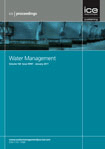
PROCEEDINGS OF THE INSTITUTION OF CIVIL ENGINEERS-WATER MANAGEMENT
Driving Change in Water Management through Scholarly ExcellencePROCEEDINGS OF THE INSTITUTION OF CIVIL ENGINEERS-WATER MANAGEMENT is a prestigious journal published by Emerald Group Publishing Ltd, dedicated to advancing the field of water management within civil engineering. With an ISSN of 1741-7589 and an E-ISSN of 1751-7729, this journal delivers peer-reviewed research that spans the critical intersections of water science and technology, contributing valuable insights into sustainable water management practices. As evidenced by its ranking in the 2023 Scopus categories, where it holds the Q3 quartile in Water Science and Technology, and a respectable position among its peers, the journal remains a vital resource for researchers, professionals, and students in the field. Though it is not an open-access journal, it offers accessible subscription options that facilitate worldwide dissemination of knowledge, enhancing its role as a fundamental reference point for cutting-edge developments in water management. For those looking to publish or stay updated on the latest research trends, this journal serves as an essential platform for promoting innovation and sustainable practices in civil engineering and water resources management.

Hydrologie und Wasserbewirtschaftung
Innovating hydrology for a thriving planet.Hydrologie und Wasserbewirtschaftung, published by the BUNDESANSTALT GEWASSERKUNDE-BFG, stands as a vital open access journal in the field of hydrology and water management since its inception in 1999. Based in Germany, this journal aims to disseminate high-quality research related to water resources, environmental sustainability, and innovative management strategies. Though it has a Q4 ranking in Water Science and Technology for 2023, and holds a Scopus rank of 113 out of 225, the journal provides an essential platform for researchers, professionals, and students interested in advancing their understanding of water science. With coverage spanning from 1999 to 2018 and a seamless move to an open access model, Hydrologie und Wasserbewirtschaftung remains committed to contributing to the ongoing dialogue around critical water issues. Researchers looking to publish their findings or stay abreast of developments in water science will find this journal indispensable.
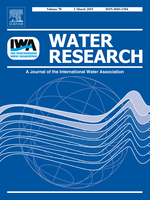
WATER RESEARCH
Exploring innovative solutions for global water challenges.WATER RESEARCH, published by Pergamon-Elsevier Science Ltd, is a premier international journal dedicated to the advancement of knowledge in the interdisciplinary field of water science and technology. With a significant impact factor, WATER RESEARCH holds a distinguished position, consistently ranking in the top quartile (Q1) across multiple categories including Civil and Structural Engineering, Environmental Engineering, and Pollution. Established in 1967 and set to continue its legacy until at least 2024, this journal provides a vital platform for researchers and professionals to disseminate cutting-edge findings related to water sustainability, quality, and management. Although the journal follows a traditional access model, its commitment to disseminating impactful research ensures that it remains an essential resource for academia and industry alike. With a rigorous selection process, the journal includes articles that significantly contribute to the understanding and resolution of global water-related challenges, making it an invaluable asset for researchers, students, and practitioners engaged in this critical area of study.

Water Resources
Exploring the depths of water science and technology.Water Resources, a prominent journal published by MAIK NAUKA/INTERPERIODICA/SPRINGER, focuses on the critical and evolving field of water science and technology. Established in 1976 and with a long-standing commitment to advancing knowledge, this journal explores interdisciplinary research that addresses the challenges surrounding water resource management, quality, and sustainability. With an impact factor positioned within the Q3 category of its field, it holds a notable Scopus rank (#181/261) in Environmental Science, emphasizing its role in driving scholarly discourse. While currently not open access, Water Resources provides vital insights for researchers, professionals, and students, making it an essential resource for those seeking to innovate and implement effective water management solutions. To stay ahead in a domain that is increasingly paramount to global sustainability efforts, consider engaging with the latest research published in this vital journal.
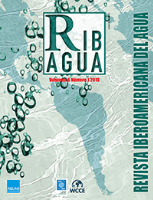
RIBAGUA-Revista Iberoamericana del Agua
Connecting researchers for a better understanding of water issues.RIBAGUA-Revista Iberoamericana del Agua is an esteemed academic journal dedicated to the study and dissemination of water-related research within the Ibero-American context. Published by TAYLOR & FRANCIS LTD, this Open Access journal has been providing a platform for scholarly articles since 2015, promoting visibility and accessibility for researchers, professionals, and students engaged in environmental science, hydrology, and water resource management. With the objective of enhancing the understanding of water issues affecting the Ibero-American region, RIBAGUA invites contributions that address innovative practices, policy implications, and scientific advancements. By fostering inter-regional dialogue and collaboration, it stands as a vital resource for those looking to contribute to sustainable water management solutions. The journal is committed to maintaining high standards of academic integrity and is ideal for anyone seeking to advance their knowledge and research in the water sciences.
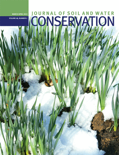
JOURNAL OF SOIL AND WATER CONSERVATION
Empowering research for resilient ecosystems.The JOURNAL OF SOIL AND WATER CONSERVATION, published by the Soil Water Conservation Society, is a leading peer-reviewed journal dedicated to the critical fields of agronomy, soil science, and water conservation. With its inception in 1973 and a convergence period extending to 2024, the journal plays a pivotal role in disseminating innovative research, management practices, and policy analysis aimed at promoting sustainable land and water resource management. The journal boasts an impressive Impact Factor and ranks in the Q1 and Q2 quartiles across key categories, including Agronomy and Crop Science, Nature and Landscape Conservation, and Water Science and Technology. It serves as an essential platform for researchers, professionals, and students to engage with cutting-edge findings that address pressing environmental challenges. Through its commitment to advancing the science of soil and water conservation, this journal remains a vital resource for enhancing ecological integrity and promoting sustainable agricultural practices.
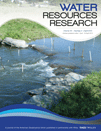
WATER RESOURCES RESEARCH
Empowering Knowledge in Water Resource ScienceWATER RESOURCES RESEARCH, published by the American Geophysical Union, stands as a premier journal in the field of environmental science, specifically within the domain of water science and technology. With an impressive impact factor and a categorical ranking of Q1 for 2023, it ranks within the top 10% of relevant journals, evidencing its critical role in advancing the knowledge and application of water resources research. Since its inception in 1965, the journal has been dedicated to rigorous research that addresses pressing global challenges related to water resource management, hydrology, and environmental sustainability. The journal's comprehensive publication scope aims to present innovative findings and methodologies that can shape effective policies and practices. Although it does not offer open access, the robust research it publishes continues to influence academics and practitioners alike, ensuring its position as an essential resource for anyone engaged in the pursuit of water-related knowledge and solutions.
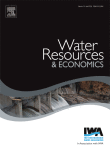
Water Resources and Economics
Transforming Water Challenges into Economic Opportunities.Water Resources and Economics, published by Elsevier, is a prestigious journal that bridges the gap between water resource management and economic theory. With an ISSN of 2212-4284, this journal has been an essential resource in the fields of Economics, Geography, and Water Science since its inception in 2013. Holding a notable Q2 ranking in the 2023 Category Quartiles for Economics and Econometrics, Geography, Planning and Development, and Water Science and Technology, it showcases cutting-edge research that addresses the increasing importance of sustainable water management in a rapidly changing climate. The journal's rigorous peer-review process ensures the dissemination of high-quality studies that influence policy and practice. As it continues to grow within the academic landscape, Water Resources and Economics strives to provide actionable insights and innovative approaches for professionals, researchers, and students invested in the sustainability and economics of water resources. For additional information, please refer to the journal’s website for access and submission guidelines.
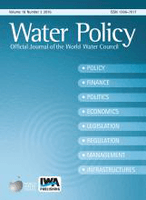
Water Policy
Fostering impactful discussions on water governance.Water Policy is a leading academic journal published by IWA PUBLISHING, dedicated to advancing the understanding of water management and policy across various disciplines. With a focus on the intricacies of water governance, the journal fosters dialogue among researchers and practitioners by presenting innovative studies and comprehensive analyses. Since transitioning to an Open Access model in 2021, it has increased accessibility to critical research, allowing for a broader reach and greater impact within the water sector. The journal's reputation is underscored by its classification in Q2 and Q3 quartiles in fields such as Geography, Planning and Development, as well as Environmental Science disciplines, marking it as a valuable resource for scholars and policymakers alike. The ISSN 1366-7017 and E-ISSN 1996-9759 facilitate streamlined access to its extensive archive, encouraging wider engagement in pivotal discussions surrounding sustainable water practices. With a commitment to shaping the future of water governance, Water Policy stands as an essential platform for sharing vital research and perspectives that contribute to effective water management globally.
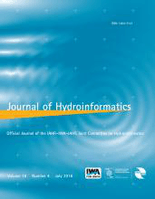
JOURNAL OF HYDROINFORMATICS
Empowering Research in Water Engineering and Sciences.JOURNAL OF HYDROINFORMATICS, published by IWA PUBLISHING in the United Kingdom, is a leading open access journal in the field of water-related sciences and engineering. Since its inception in 1999, it has evolved to become a pivotal platform for the dissemination of significant research and innovative findings, especially after adopting an open access model in 2021. The journal spans a broad scope, intersecting various disciplines such as atmospheric science, civil and structural engineering, geotechnical engineering, and water science and technology, with its 2023 rankings placing it impressively in the Q2 quartile across several categories. With an impact factor reflective of its esteemed position within the academic community and its reach underscored by its Scopus rankings, the JOURNAL OF HYDROINFORMATICS appeals to a diverse readership including researchers, professionals, and students dedicated to advancing knowledge in hydroinformatics and related fields. Whether you are seeking to publish your cutting-edge research or to stay informed on the latest developments, this journal serves as an indispensable resource.